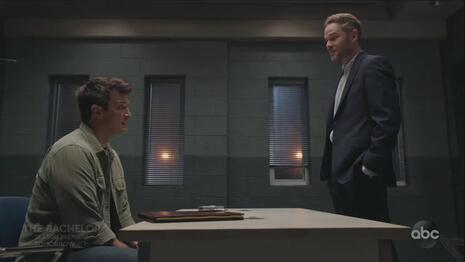 Right from the season three premiere, ABC’s The Rookie aims to get political on policing.
Right from the season three premiere, ABC’s The Rookie aims to get political on policing.
On January 3’s episode, “Consequences,” main character John Nolan (Nathan Fillion), a rookie cop, is in a heap of legal trouble after being framed by Detective Nick Armstrong (Harold Perrineau). But John’s lawyer, Wesley (Shawn Ashmore), quickly reminds John he’s being treated better because of his race:
Wesley: Nolan? Do you understand? Nolan.
John: What?
Wesley: Technically, you're not under arrest. You're cooperating. But once you're not free to leave beyond a brief detention, that constitutes an arrest and starts the clock. D.A. Will have 72 hours to present their case against you.
John: Yeah, I-I know -- I know that.
Wesley: Of course. But I also know that you're in shock, and I need you to focus. If convicted, you're looking at 25 years, which is why you need to let me do all the talking. One mistake, one ill-chosen word, and you are going to prison.
John: But we don't have to play it like that. The truth is on my side.
Wesley: And you think that means something? [ Scoffs ] If you were any other defendant --
John: What?
Wesley: Never mind.
John: No, I want to know. If I was any other defendant, what?
Wesley: You are a white man. A cop. You have already been treated with a level of deference my other clients would never get. If you were black or brown, the police would've created exigent circumstances and kicked the door in, shot you if they thought you reacted aggressively, arrested you if you surrendered, confident that the D.A. would bully you into a plea deal.
John: That's not fair. I'm not that kind of cop. Neither is Grey.
Wesley: You telling me you've never bent the rules?
John: Not like that.
Wesley: Look, you have a chance to survive this because of who you are. But only if you do exactly what I say.
This scene was quite purposeful. Entertainment Weekly quickly published an episode recap, which featured a discussion with show creator Alexi Hawley, who referred to the scene as “incredibly necessary” and said that it “probably would not have existed in the form that they have without this movement going on.”
Hawley acknowledged the conversation focuses on:
how Nolan's experience differs from many other people. Specifically, Wesley's clients of color. Him being a white male cop had a profound impact on the way they dealt with him versus the way they would deal with other people who didn't look like him.
The show telegraphed that it would be "addressing the Black Lives Matter movement that exploded in the wake of the George Floyd murder in May of 2020" in an article Entertainment Weekly published last month:
The show is poised to address these issues, as laid out in a panel "Scripted Police Series and Their Impact on Culture," which welcomed Hawley and Fillion, as well as other The Rookie producers and cast members alongside representatives from organizations Breaking Barriers United and Color of Change.
Color of Change was also referenced in another December article on The Rookie, from The Hollywood Reporter, “How One Writers Room Is Rethinking Policing on TV.” The organization released a 153-page report early last year, Normalizing Injustice, which THR called, “rather damning,” and described as a report which "details the myriad ways the medium, subtly and overtly, undermines racial equality — at the top of 2020, Color of Change’s Hollywood arm has spent the year since walking welcoming writers, producers and executives through their findings."
THR noted that Kristen Marston, the organization’s culture and entertainment advocacy director, has “consulted on more than 100 TV series about issues facing Black Americans,” and she is quoted saying, "What we see on TV, it impacts the way we vote, the way that we react to people and even the way that we either believe Black Lives Matter is a terrorist organization or not. These things are so foundationally important.”
Color for Change was also referenced in the Salt Lake Tribune’s reporting on The Rookie "trying to be a different police show in the age of Black Lives Matter."
And, lest anyone think this was just a one episode storyline for The Rookie, Terence Paul Winter, an executive producer and writer, mentioned they "can’t do one special episode, where we feel good and solve racism in the end, and then go back to our usual thing the next week. We want to change things for as long as we get to do this show.”
Viewers better get used to this, then.






